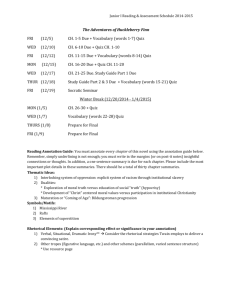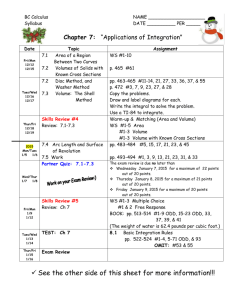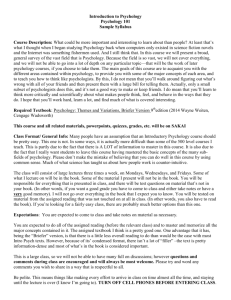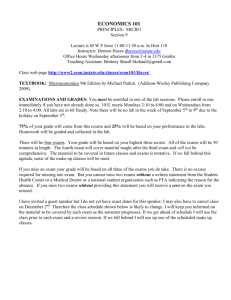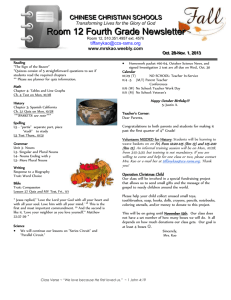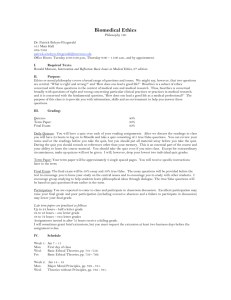Psy 240 Cognitive Psychology - Personal Websites
advertisement
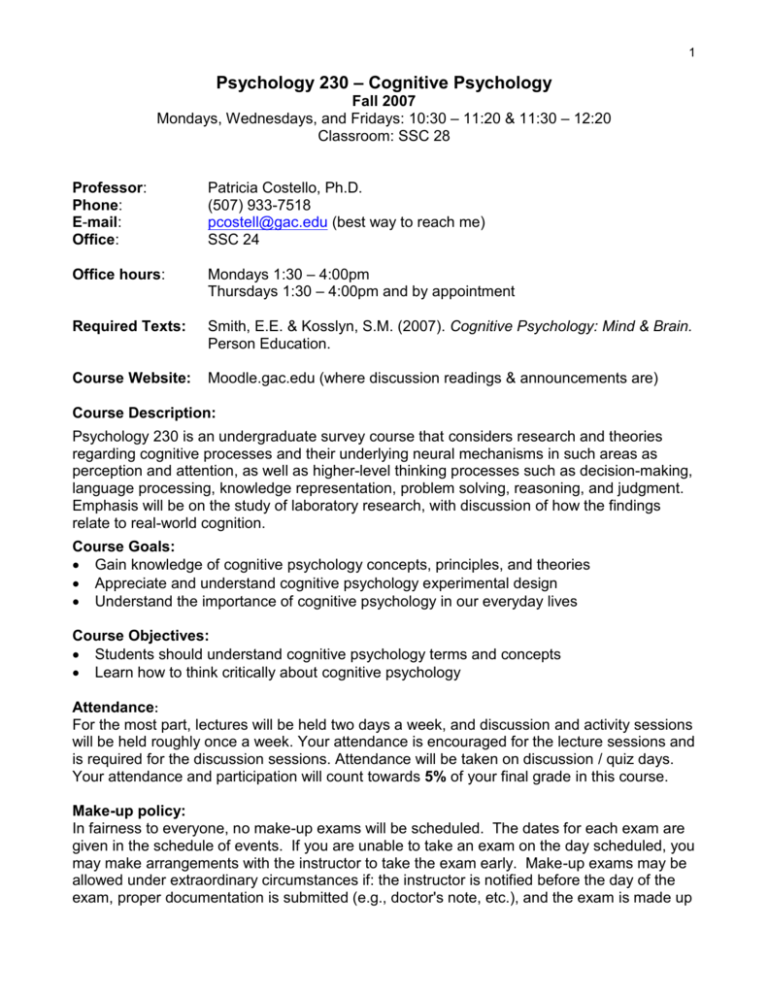
1 Psychology 230 – Cognitive Psychology Fall 2007 Mondays, Wednesdays, and Fridays: 10:30 – 11:20 & 11:30 – 12:20 Classroom: SSC 28 Professor: Phone: E-mail: Office: Patricia Costello, Ph.D. (507) 933-7518 pcostell@gac.edu (best way to reach me) SSC 24 Office hours: Mondays 1:30 – 4:00pm Thursdays 1:30 – 4:00pm and by appointment Required Texts: Smith, E.E. & Kosslyn, S.M. (2007). Cognitive Psychology: Mind & Brain. Person Education. Course Website: Moodle.gac.edu (where discussion readings & announcements are) Course Description: Psychology 230 is an undergraduate survey course that considers research and theories regarding cognitive processes and their underlying neural mechanisms in such areas as perception and attention, as well as higher-level thinking processes such as decision-making, language processing, knowledge representation, problem solving, reasoning, and judgment. Emphasis will be on the study of laboratory research, with discussion of how the findings relate to real-world cognition. Course Goals: Gain knowledge of cognitive psychology concepts, principles, and theories Appreciate and understand cognitive psychology experimental design Understand the importance of cognitive psychology in our everyday lives Course Objectives: Students should understand cognitive psychology terms and concepts Learn how to think critically about cognitive psychology Attendance: For the most part, lectures will be held two days a week, and discussion and activity sessions will be held roughly once a week. Your attendance is encouraged for the lecture sessions and is required for the discussion sessions. Attendance will be taken on discussion / quiz days. Your attendance and participation will count towards 5% of your final grade in this course. Make-up policy: In fairness to everyone, no make-up exams will be scheduled. The dates for each exam are given in the schedule of events. If you are unable to take an exam on the day scheduled, you may make arrangements with the instructor to take the exam early. Make-up exams may be allowed under extraordinary circumstances if: the instructor is notified before the day of the exam, proper documentation is submitted (e.g., doctor's note, etc.), and the exam is made up 2 as soon as possible. There are absolutely NO MAKE UP QUIZZES. Please do not ask. There are only six quiz dates, and you are allowed to drop your lowest score (or miss one quiz). On work submitted late: All work is expected to be handed in on time. Late work will lose 10% of the assignment's credit point value for each day that the assignment is past due. All assignments are due IN CLASS. Assignments are considered to be late if they are handed in or emailed after class ends. Accommodating Disabilities Students with documented disabilities are invited to see me as soon as possible to discuss your needed accommodations. Students without documented disabilities who feel they may have difficulty with this course also are invited to see me to discuss what we can do together to help you succeed. Course Methods: Lectures - A substantial portion of class time will be used to present lecture material to elaborate on the text. Discussion - Students are strongly encouraged to be "active learners" in this course. This means asking questions and contributing your own experiences and views to the class while respecting those of your classmates. Discussion sessions will be held six times, with five of these student-lead (more information below). This will include small group discussion and discussion among the class as a whole. The class will also participate in activities related to cognitive psychology. Course Assignments: Exams: There will be three exams during the semester. These exams will cover the material in the assigned readings and lectures, and material covered in the discussion and activity sessions. Exams will be worth 65% of your final total grade. The first two exams are worth 20% each. The third (final) exam is not cumulative, but is worth 25%. Exams will not be curved. Exam material will be drawn from lectures, readings, and discussion. The exams will consist of multiple choice, figure completions and short answer. Quizzes: There will be a brief quiz before each discussion day (6 total) with questions based on the discussion reading for that day. You can drop your lowest quiz score, so the top five quiz scores will count toward your final grade. Quizzes are worth 5 points each. There are absolutely NO MAKE UP QUIZZES. Please do not ask. There are only six quiz dates, and you are allowed to drop your lowest score (or miss one quiz). Article discussions: There are six student-lead discussion days. Five students will lead each discussion. Each student will be in charge of presenting one section of the paper (introduction, methods, results, and discussion - two). Each presenter will also provide a discussion question for small group discussion. More details will be provided in class. 3 Grading: Your grade will be based on the following: exams (65%), quizzes (15%) discussion lead (15%), and participation/attendance (5%). GRADING SUMMARY Discussion: Exams (3): Quizzes (best 5) Participation/attendance 15% 65% (first two, 20% each, final exam 25%) 15% 5% Grand Total 100% BASIC GRADING SCALE (%) Grade Cutoffs: A 93 – 100%, A- 90 - 92%, B+ 87 - 89%, B 83 - 86%, B- 80 - 82%, C+ 77 - 79%, C 73 - 76%, C70 – 72%, D, 60 – 69%, F <60 All papers and exams scores are converted to the percentages discussed above. Student Academic Conduct: Every student is expected to act responsibly and honestly. Misconduct is considered sufficient grounds for the designation of a failing grade in the course. Examples of misconduct include but are not strictly limited to the following: Copying answers from another student’s exam paper during an examination. Permitting another student to copy your answers. Consulting notes of any sort during a closed book examination. Copying another student’s paper assignment, or allowing another student to copy your assignment Plagiarizing – if you are unsure as to what constitutes plagiarism, please consult: http://people.brandeis.edu/~teuber/usemplagiarism.html - you are responsible for following the rules You will receive a “0” on the paper or exam if you are caught cheating / plagiarizing You should be familiar with and abide by the Gustavus Adolphus College Honor Code (see http://www.gustavus.edu/academics/general_catalog/current/index.cfm?pr=acainfo) 4 Course Schedule (Topics subject to change, exams dates are fixed) Date Wed Sept 5th Topic Readings/Assignments Due Introduction to the course Fri Sept 7th The brain and the mind Chapter 1 Mon Sept 10th The brain and the mind Chapter 1 Wed Sept 12th Perception Chapter 2 Fri Sept 14th Perception Chapter 2 Mon Sept 17th Attention Chapter 3 Wed Sept 19th Attention Chapter 3 Face perception Video Mon Sept 24th Attention Wed Sept 26th Representation & Knowledge in LTM Representation & Knowledge in LTM Representation & Knowledge in LTM No class - Nobel conference EXAM 1 Article Discussion 1 (Strayer & Johnston, ‘01) & quiz Chapter 4 Fri Sept 21st Fri Sept 28th Mon Oct 1st Wed Oct 3rd Fri Oct 5th Chapter 4 Quiz show EXAM 1 Mon Oct 8th Encoding & retrieval in LTM Chapter 5 Wed Oct 10th Encoding & retrieval in LTM Chapter 5 Fri Oct 12th Encoding & retrieval in LTM Mon Oct 15th Working memory Article Discussion 2 (Roediger & McDermott, ‘95) & quiz Chapter 6 Wed Oct 17th Working memory Chapter 6 Fri Oct 19th Working memory Activity Mon Oct 22nd Reading Day – no class Wed Oct 24th Executive processes Chapter 7 Fri Oct 26th Executive processes Chapter 7 Mon Oct 29th Executive processes Wed Nov 31st Emotion Article Discussion 3 (Casey et al, ’97) & quiz Chapter 8 Fri Nov 2nd Emotion Chapter 8 5 Mon Nov 5th Wed Nov 7th Quiz show EXAM 2 EXAM 2 Fri Nov 9th Decision making Chapter 9 Mon Nov 12th Decision making Chapter 9 Wed Nov 14th Decision making Article Discussion 4 (Dijksterhuis et al, ’06) & quiz Fri Nov 16th Problem solving & reasoning Chapter 10 Mon Nov 19th Problem solving & reasoning Chapter 10 Wed Nov 21st No class - Thanksgiving Fri Nov 23rd No class - Thanksgiving Mon Nov 26th Problem solving & reasoning Wed Nov 38th Motor cognition Article Discussion 5 (Tversky & Kahneman, ’74) & quiz Chapter 11 Fri Nov 30th Motor cognition Chapter 11 Mon Dec 3rd Motor cognition Wed Dec 5th Language Article Discussion 6 (Ruby & Decety, ’01) & quiz Chapter 12 Fri Dec 7th Language Chapter 12 Mon Dec 10th Language Activity Wed Dec 12th Fri Dec 14th Quiz show Class Wrap-up FINAL - EXAM 3


